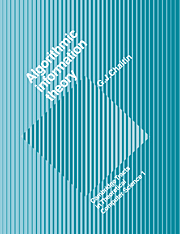Book contents
- Frontmatter
- Contents
- Foreword
- Preface
- Figures
- 1 Introduction
- I Formalisms for Computation: Register Machines, Exponential Diophantine Equations, & Pure LISP
- II Program Size, Halting Probabilities, Randomness, & Metamathematics
- 5 Conceptual Development
- 6 Program Size
- 7 Randomness
- 8 Incompleteness
- 9 Conclusion
- A Implementation Notes
- B The Number of S-expressions of Size N
- Bibliography
8 - Incompleteness
Published online by Cambridge University Press: 23 November 2009
- Frontmatter
- Contents
- Foreword
- Preface
- Figures
- 1 Introduction
- I Formalisms for Computation: Register Machines, Exponential Diophantine Equations, & Pure LISP
- II Program Size, Halting Probabilities, Randomness, & Metamathematics
- 5 Conceptual Development
- 6 Program Size
- 7 Randomness
- 8 Incompleteness
- 9 Conclusion
- A Implementation Notes
- B The Number of S-expressions of Size N
- Bibliography
Summary
Having developed the necessary information-theoretic formalism in Chapter 6, and having studied the notion of a random real in Chapter 7, we can now begin to derive incompleteness theorems.
The setup is as follows. The axioms of a formal theory are considered to be encoded as a single finite bit string, the rules of inference are considered to be an algorithm for enumerating the theorems given the axioms, and in general we shall fix the rules of inference and vary the axioms. More formally, the rules of inference F may be considered to be an r.e. set of propositions of the form
“Axioms | –F Theorem”.
The r.e. set of theorems deduced from the axiom A is determined by selecting from the set F the theorems in those propositions which have the axiom A as an antecedent. In general we'll consider the rules of inference F to be fixed and study what happens as we vary the axioms A. By an n-bit theory we shall mean the set of theorems deduced from an n-bit axiom.
Incompleteness Theorems for Lower Bounds on Information Content
Let's start by rederiving within our current formalism an old and very basic result, which states that even though most strings are random, one can never prove that a specific string has this property.
As we saw when we studied randomness, if one produces a bit string s by tossing a coin n times, 99.9% of the time it will be the case that H(s) ≈ n + H(n). In fact, if one lets n go to infinity, with probability one H(s) > n for all but finitely many n (Theorem R5).
- Type
- Chapter
- Information
- Algorithmic Information Theory , pp. 146 - 162Publisher: Cambridge University PressPrint publication year: 1987



